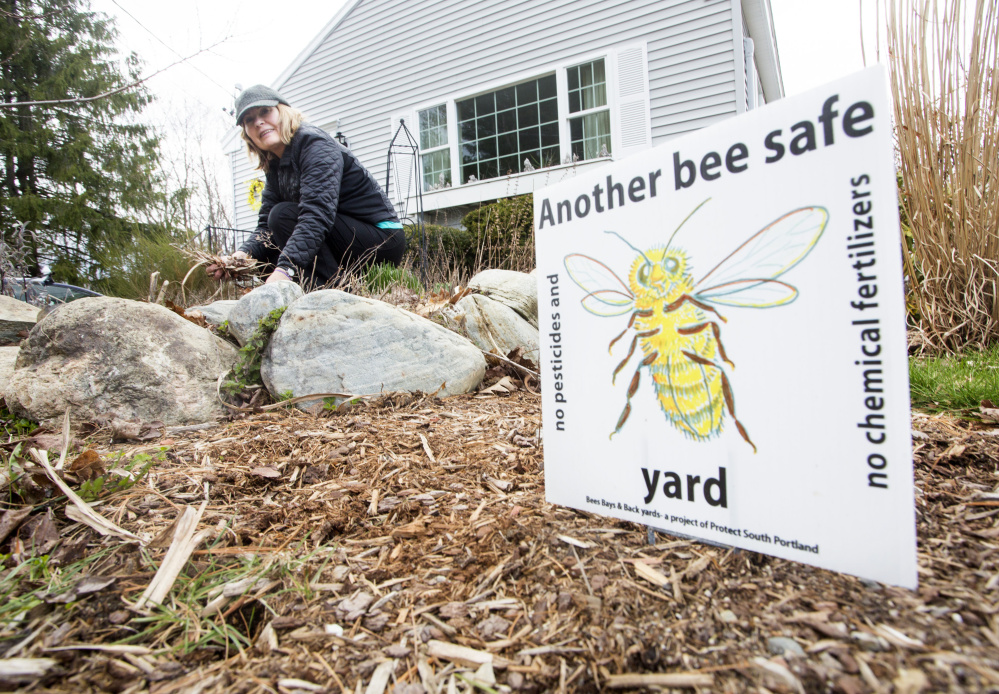I support the city of South Portland’s efforts to reduce toxins and protect Casco Bay by passing a comprehensive pesticide ordinance.
When I was a teenager, my family lived on Mill Cove in South Portland. My brother and I would go swimming right off our lawn. Back then, I had no idea that our lawn and the products we used to make it green had anything to do with water quality in Casco Bay.
Modern lawn care practices are based on the chemical advances that came out of World War II: in particular, the development of poison that could kill weeds but leave grass standing.
There was a time when dandelions and clover were a normal and beneficial part of our lawns. The dandelions provided food for bumblebees. The clover took nitrogen from the air and fixed it in the soil, where it served as a natural fertilizer. If you’re old enough, you can remember a time when bags of grass seed from the hardware store came with clover seed mixed right in to serve this important role.
With the new herbicides came the possibility of a perfectly weed-free lawn. However, there were some drawbacks.
• First, without clover, the grass turns yellow from lack of nitrogen. This problem is addressed by applying synthetic fertilizer.
• Second, pests like grubs find the tender roots of an all-grass lawn irresistible. Again, modern chemistry can solve this problem with a timely application of insecticides.
This cycle of lawn chemical use is good business for the companies that manufacture and apply pesticides. Here in Maine, the state Board of Pesticides Control has charted an astounding 700 percent increase in the home use of pesticides just in the past 20 years. It takes a lot of chemicals and a lot of money to keep a big lawn looking like a golf course.
A chemically treated lawn also raises health concerns. Pesticides are designed to kill nuisance plants and insects, but they can have unintended impacts on human and animal health. Trained applicators know this. They wear protective equipment while spraying, and they are required to post those little paper warning signs we see around town all spring, summer and fall.
Despite these precautions, pesticide exposure hurts our families, our pets, beneficial insects like honeybees and our iconic lobsters. To pick just one example, a recent study linked pesticide exposure with cancer in dogs. Canine malignant lymphoma is up to 70 percent more prevalent in households that have their lawns treated with pesticides compared to households that have natural lawns.
In light of the financial costs of repeated chemical treatments and the health risks of pesticide exposure, I make the personal choice to keep my lawn chemical free. Unfortunately, lawn care choices have a broader impact beyond the edge of any individual lawn.
Increasingly, Casco Bay is bearing the brunt of our reliance on chemicals to achieve weed-free lawns. Every year, Mainers volunteer hundreds of hours to collect water samples along the coast. This massive effort is organized and led by the Friends of Casco Bay.
Every year they find pesticides, which threaten ocean life, and excess nitrogen, which causes algae blooms. It is estimated that a third of the excess nitrogen in the bay comes from nonpoint source pollution, including fertilizer from lawns carried by rainfall and snowmelt moving over and through the ground.
To address the increase in pesticide use and the decrease in Casco Bay water quality, the South Portland City Council has decided to follow the lead of the town of Ogunquit and promote an organic land care ordinance. This ordinance will restrict problematic chemicals while promoting a natural approach to turf management.
A natural lawn has living soil, a diversity of plants, healthy pollinators and no added chemicals. Organic land care is not about replacing synthetic pesticides with organic pesticides. Instead, it is about creating a robust system that can stand up to weeds, pests and drought.
Maintaining a natural lawn is cheap, and it is better for both the bees and the bay. I applaud the South Portland City Council and city staff for taking a leadership role in protecting our health.
Copy the Story LinkSend questions/comments to the editors.



Success. Please wait for the page to reload. If the page does not reload within 5 seconds, please refresh the page.
Enter your email and password to access comments.
Hi, to comment on stories you must . This profile is in addition to your subscription and website login.
Already have a commenting profile? .
Invalid username/password.
Please check your email to confirm and complete your registration.
Only subscribers are eligible to post comments. Please subscribe or login first for digital access. Here’s why.
Use the form below to reset your password. When you've submitted your account email, we will send an email with a reset code.